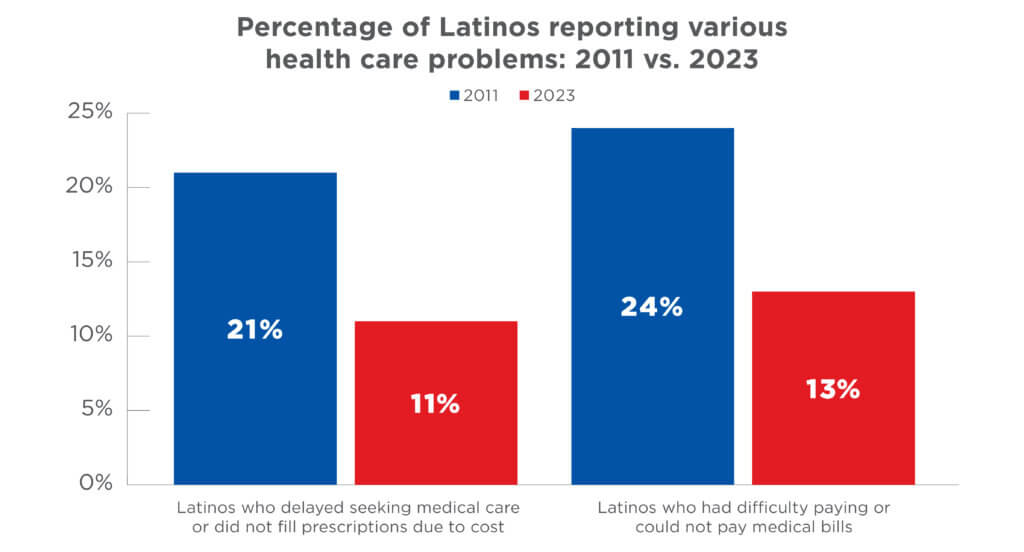(UnidosUS) —
Stan Dorn, Health Policy Director, UnidosUS
In the 15 years since the Affordable Care Act (ACA) was signed into law on March 23, 2010, Latinos have substantially improved their access to health care and their protection against unaffordable health care costs. From 2011 to 2023 (Figure 1):
- The proportion of Latinos who either delayed seeking health care or did not fill prescriptions because of cost plunged from 21% to 11%.
- The proportion of Latinos who had difficulty paying or could not pay their medical bills plummeted from 24% to 13%.
Figure 1. Latinos’ access to health care and protection from unaffordable health care costs substantially improved since the Affordable Care Act took effect
 Source: UnidosUS analysis of National Health Interview Survey accessed via IPUMS, University of Minnesota, www.ipums.org.
Source: UnidosUS analysis of National Health Interview Survey accessed via IPUMS, University of Minnesota, www.ipums.org.
Keep up with the latest from UnidosUS
Sign up for the weekly UnidosUS Action Network newsletter delivered every Thursday.
- 9 million additional Latinos have health insurance. As a result, the percentage of Latinos without health coverage has fallen to its lowest level in American history.
- More than 45 million Hispanic adults with preexisting conditions are protected against insurance company discrimination.
- 20 million Latinas are protected from insurance company discrimination based on gender.
- 53 million people in Hispanic families are guaranteed free preventive care, without co-payments or deductibles.
- 2 million young Latino adults are covered through their parents’ health plans.
This progress has several key underpinnings. One is a growth in the number of Latinos covered by Medicaid, from 14 million in 2010 to more than 20 million in 2023, due in large part to expanded Medicaid eligibility under the ACA. Another is the near tripling of the number of Hispanics buying their own health insurance through the ACA marketplace, reaching more than 5 million people as of 2024.
However, in late February, the House approved a budget resolution that threatens to reverse 15 years of progress. It proposes the largest Medicaid cuts in U.S. history, redirecting those funds to provide tax breaks that largely benefit major corporations and the country’s wealthiest individuals. No Democrats voted for the House budget resolution, and all Republicans but one voted in its favor, resulting in party-line passage by a single vote. If the Senate adopts anything like the House budget resolution, millions of Americans will almost certainly lose their health insurance coverage, disproportionately harming the Latino community.
Other serious threats loom as well:
- The Republican majority in Congress has not agreed to continue enhanced premium tax credits that lower health insurance costs for people who buy their own insurance in the ACA marketplace. Unless they are extended, those enhanced credits will expire after this year. If that happens, health insurance costs will rise by $1,200 a year for the average person. The number of uninsured will grow by more than 5 million, according to a leading actuarial firm, and half of Latinos who buy their own ACA insurance will be forced to drop it.
- The Trump administration has proposed changes to the ACA marketplace that would add new paperwork burdens for people seeking health coverage. These regulations would also rip away health care from DACA holders, often known as “dreamers,” who were brought to the United States as children and are now busy raising families, getting an education and supporting their communities through hard work and military service. According to the administration’s own estimates, up to 2 million people could lose their health insurance due to these steps.
- The Trump administration has cut 90% of the funding for community agencies that help people fill out the paperwork needed to sign up for ACA coverage, Medicaid and the Children’s Health Insurance Program (CHIP). Ironically, at the same time paperwork burdens are made more onerous by proposed regulations, the Trump administration is taking away the expert help that people need to cope with that paperwork.
- Hispanic families are already pulling back from participating in programs for which they qualify. A significant “chilling effect” has resulted from two factors: heightened immigration enforcement makes people reluctant to come to the attention of government agencies; and fears of a possible future “public charge” rule create worries that obtaining health coverage might endanger families’ future ability to legalize. Among others denied health care through this chilling effect are children of immigrant parents, most of whom were born in the U.S. and are American citizens.
- Under the banner of fighting “Diversity, Equity, and Inclusion,” the Trump administration is slashing civil rights enforcement efforts that protect communities of color from unlawful conduct. We may see federal attempts to roll back prohibitions of discrimination against people whose primary language is Spanish, limiting both their enrollment into programs for which they qualify and their ability to obtain essential medical care on fair and equal terms.
- One of the President’s many Executive Orders has called for eliminating public benefits for non-citizens, to the extent permitted by current law. This could become the basis for future attacks on immigrant eligibility for health coverage, including coverage for people who have been lawfully present in the United States for many years.
To defend its gains under the ACA, the Latino community and its many partners will need to fight on multiple fronts, starting by rebuffing the current Congressional attacks on Medicaid. With smart and diligent effort, we can and must work with allies to limit near-term losses and lay the groundwork for a much better future for Latino families’ health and well-being in the years to come.
—
Read More News from UnidosUS
